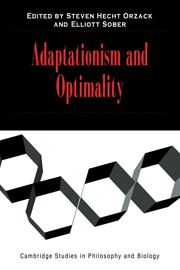Book contents
- Frontmatter
- Contents
- Contributors
- Acknowledgments
- Introduction
- 1 A Likelihood Framework for the Phylogenetic Analysis of Adaptation
- 2 Adaptation, Phylogenetic Inertia, and the Method of Controlled Comparisons
- 3 Optimality and Phylogeny: A Critique of Current Thought
- 4 Fit of Form and Function, Diversity of Life, and Procession of Life as an Evolutionary Game
- 5 Optimality and Evolutionary Stability under Short-Term and Long-Term Selection
- 6 Selective Regime and Fig Wasp Sex Ratios: Toward Sorting Rigor from Pseudo-Rigor in Tests of Adaptation
- 7 Is Optimality Over the Hill? The Fitness Landscapes of Idealized Organisms
- 8 Adaptation, Optimality, and the Meaning of Phenotypic Variation in Natural Populations
- 9 Adaptationism, Optimality Models, and Tests of Adaptive Scenarios
- 10 Adaptation and Development: On the Lack of Common Ground
- 11 Three Kinds of Adaptationism
- 12 Adaptation, Adaptationism, and Optimality
- Index
10 - Adaptation and Development: On the Lack of Common Ground
Published online by Cambridge University Press: 06 January 2010
- Frontmatter
- Contents
- Contributors
- Acknowledgments
- Introduction
- 1 A Likelihood Framework for the Phylogenetic Analysis of Adaptation
- 2 Adaptation, Phylogenetic Inertia, and the Method of Controlled Comparisons
- 3 Optimality and Phylogeny: A Critique of Current Thought
- 4 Fit of Form and Function, Diversity of Life, and Procession of Life as an Evolutionary Game
- 5 Optimality and Evolutionary Stability under Short-Term and Long-Term Selection
- 6 Selective Regime and Fig Wasp Sex Ratios: Toward Sorting Rigor from Pseudo-Rigor in Tests of Adaptation
- 7 Is Optimality Over the Hill? The Fitness Landscapes of Idealized Organisms
- 8 Adaptation, Optimality, and the Meaning of Phenotypic Variation in Natural Populations
- 9 Adaptationism, Optimality Models, and Tests of Adaptive Scenarios
- 10 Adaptation and Development: On the Lack of Common Ground
- 11 Three Kinds of Adaptationism
- 12 Adaptation, Adaptationism, and Optimality
- Index
Summary
Science magazine recently asked more than 100 developmental biologists two questions. The first asked for opinions on the greatest unanswered questions in developmental biology. The second asked which areas would see the most progress in the next five years. Among the unanswered questions, “What is the relation between development and evolution?” scored second, just behind “What are the molecular mechanisms of morphogenesis?” But when the respondents were asked to name the areas in which progress was expected, the role of development in evolution fell to 11th out of 12. No other question showed so much disparity between importance and expectation of progress (Barinaga 1994).
The study of adaptation is at the core of modern evolutionary biology. Natural selection, the explanation of adaptation, is also the primary force for evolutionary change. Developmental biology is only at the periphery of this study, even with the recent explosion of knowledge in molecular and developmental genetics. The Science questionnaire showed that developmental biologists are very interested in the relevance of development to evolution but are pessimistic about discovering its nature.
Developmental biology is not integrated into mainstream evolutionary biology. In this chapter I argue that this situation has resulted from clashes in methodology between the primarily adaptationist practices, methodologies, and theories of mainstream evolution theory and the contrasting practices, methodologies, and theories of developmental biology.
Contemporary evolution theory has its origins in the Modern Synthesis of the 1930s and 1940s (Mayr and Provine 1980). The Synthesis was centered on population genetics.
Information
- Type
- Chapter
- Information
- Adaptationism and Optimality , pp. 303 - 334Publisher: Cambridge University PressPrint publication year: 2001
Accessibility standard: Unknown
Why this information is here
This section outlines the accessibility features of this content - including support for screen readers, full keyboard navigation and high-contrast display options. This may not be relevant for you.Accessibility Information
- 28
- Cited by
